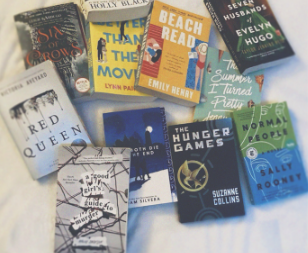
As of December 2023, #Booktok has garnered over 200 billion views on TikTok. “BookTok” is one of the largest communities on TikTok, and the online creators for it have shared millions of book reviews, recommendations and more. It has completely revolutionized the way the publishing industry markets books.
Since Booktok’s introduction, complex plots have been traded for ubiquitous tropes, and in-depth reviews have been replaced by shortened summaries, often not even in full sentences. The ability to be condensed into short, eye-catching content, curated for social media, seems to be the current key to authors’ success. They are pressured by social media to trade originality for trendy plot devices in order to capitulate to the publishing industry’s new methods — and it’s only gotten more difficult.
The first book-related community to appear on social media was on YouTube in 2010. As reading-centered creators started to grow their following, publishers realized how popularity on social media platforms could increase a book’s sales. To take advantage of this, Advanced Reader Copies (ARCs) — non-finalized copies of books — started to be sent to popular social media creators so they could create content that would build anticipation for upcoming releases. While this practice wasn’t new, it was the first time ARCs had been so effective at publicizing new books.
Due to the common long-form video format of YouTube, full summaries were still plentiful in 2010. When book content started spreading to Instagram around 2014 and 2015, shorter reviews and recommendations became more common. However, content about the specifics of a book’s plot were often included in the posts’ captions.
In 2020, BookTok was formed by user Cait Jacobs (@caitsbooks). During the COVID-19 pandemic, she started an account to post about books, a passion she had nurtured for years. Jacobs quickly gained a following, as book lovers were happy to see content related to an interest of their own. Many were even inspired to start their own accounts.
While BookTok focused largely on fantasy books at first — the preferred genre of many of the early creators — it quickly shifted focus to romance, which has been in the spotlight ever since. Because of the common tropes used in romance books and TikTok’s 15-second time limit for videos at the time, book reviews slowly became defined by tropes. This resulted in many\ books being mismarketed.
“The Cruel Prince,” by Holly Black, is a very popular young-adult political fantasy with a minuscule amount of romance. The romance subplot takes up a chapter or two of each book in the series, yet the book is known for its “enemies to lovers” trope. Many of the book’s over 21,000 one-star reviews mention how readers had been expecting a fantasy romance that, in reality, never occurred. In their one-star review of Black’s book, Goodreads user Laura (@philtatosaxiom), wrote, “I wish (the main characters’) relationship had been explored more throughout the book, not necessarily explicitly but more moments where only the two of them interact.”
This isn’t an occasional occurrence. “The Hunger Games,” by Suzanne Collins, is an incredibly well-known young-adult dystopian series. It’s received copious amounts of praise for the social commentary Collins weaved into every aspect of the story, yet it is so often marketed around its love triangle subplot.
In some cases, this can have bigger detriments. Sally Rooney’s “Normal People” follows two young people throughout the course of several years, as they navigate their relationship through school and strive to find their places in the world. Because of the realism of their relationship, there’s a lot of miscommunication between the protagonists. Unfortunately, a lot of people don’t like this “miscommunication trope” — another common label popularized through BookTok — so when the novel became so heavily defined by it on social media, many people refused to even try reading the book, regardless of whether the plot sounded interesting or not.
When books are built off of tropes, they lose nuance and originality. There’s a big difference between using social media to spread the word about a book and demanding that authors write books in a way that makes them likely to go viral. Minimizing common tropes’ presence in future books is essential to maintaining space in the publishing industry for unique and imaginative stories that can’t be described in a 15-second social media post.




